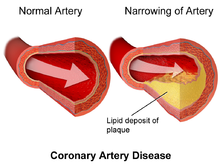Coronary Artery Disease

Coronary Artery Disease
Dr. Claire Arcidiacono, ND
Coronary artery disease is considered to be the most common type of heart disease in the United States. Other names for coronary artery disease include coronary heart disease or ischemic heart disease. (1) While most people have heard the name coronary artery disease (CAD for short) and have even read the name throughout this series just knowing the name doesn’t mean you know what it is. So just what IS CAD? CAD is a type of heart disease where the arteries of the heart cannot bring enough blood to the heart. It is called CAD because it specifically refers to the coronary arteries. So basically in CAD the coronary arteries are unable to bring enough blood to the heart. Related to CAD is a condition called coronary microvascular disease which affects the tiny arteries within the heart. Just as an aside women are more likely to be affected by coronary microvascular disease. (2) What does this look like? Well take a look at the attached picture! (5)

One of the main points I want to make about CAD is that it may be asymptotic. Which is why it is always important to do our yearly physicals which can catch certain risk factors that we may have such as high cholesterol. Having these tests can help to catch something like CAD even when we don’t have any symptoms because if we have the risk factors the doctor will investigate further! That said what are the most common signs of CAD? Angina is one of the most common signs of CAD. Take a look at my blog for a quick refresher on what Angina is. Another common symptom is shortness of breath. As the CAD worsens over time the symptoms will also worsen over time. CAD may also mimic heartburn. (3) Now as I have mentioned before while women can and do present with typical symptoms they also can and usually do present with more atypical symptoms when it comes to heart health. In the case of CAD these include extreme fatigue, sleep changes, indigestion and anxiety. (4)
Now what are the risk factors for CAD? The number 1 risk factor is atherosclerosis because the buildup of plaque lowers the size of the opening of the blood vessel thus lowering how much blood can go through it. Other risk factors include smoking, diabetes, high blood pressure, high cholesterol and being overweight or obese. Additionally having a poor diet, a lack of exercise and stress can all increase our risk for CAD. (5) Studies have found that approximately half of all cases are linked to genetics! (6) Studies have also found that smoking even 1 cigarette a day can increase the risk of CAD! (7) Certain autoimmune disorders such as Rheumatoid arthritis, Lupus and Psoriasis can all increase the risk of CAD. (5) Other studies have found that job stress alone can account for 3% of all cases of CAD! (8) For females under the age of 40 having endometriosis is also a risk factor. (5) While this list is not all the risk factors that cause CAD they are the most common.
What are the most common complications of CAD? Well as we know CAD can have some pretty severe complications. CAD can lead to heart attack, heart failure, irregular heart rhythms (arrhythmias) and angina. (9) As you can see these are possible complications that are better avoided than having to treat after the fact. But can we do anything to lower our risk of CAD? Absolutely! First it’s a great idea to have routine blood work to see what risk factors you may have. Then here are some tips and tricks to help!
- Life style changes that can help reduce the risk of CAD (5)
- Dietary changes to increase vegetable, fruit and lean protein intake. Decrease processed foods and those foods that are high in sugar and saturated fats.
- Increase activity. I don’t mean you have to become a gym buff every day. Even walking daily can be helpful. Find an activity that you like. It does no good to try running if you hate to run. Personally I like doing certain cardio and find it fun. But as I said do what works for you!
- Lose weight! Now making healthier choices and increasing activity can help with this. For more information please check out a blog by my colleague Allie Might – Tips and tricks!
- Stop smoking and reduce alcohol intake!
- Aged Garlic has been found to help to slow down the progression of CAD. One method that has been studied is via garlics ability to inhibit atherosclerosis and remember there are studies that have found that garlic can help with cholesterol and high blood pressure too! (10) Please see Invite’s Aged garlic
- Omega 3s have been found to be very helpful for the heart. In fact studies have found that omega 3s can help reduce the rates of CAD! (11) Please see Invite’s Fish Oil, Krill Oil, Biomega
- Nattokinase is an amazing supplement! In fact I recently wrote a whole blog about it! Studies agree that Nattokinase is a powerhouse at reducing atherosclerosis and thus reduces the number one risk factor for CAD. (12) For more information please check out my blog on Nattokinase! And please take a look at Invite’s Nattokinase
- Plant sterols have also been found in studies to help lower our cholesterol. (13) Please see Invite’s Sterols Plus and Sterols Formula
- Beets Hx is another product that is helpful for the heart and heart health and I recently wrote a blog about this. Take a look at my product highlight on Beets Hx!
- Greens Hx… wait Greens Hx for heart health??? Just wait and see! I will be highlighting this classic supplement in an unexpected way for our product spotlight!
Sources:
- https://www.cdc.gov/heartdisease/coronary_ad.htm
- https://www.nhlbi.nih.gov/health/coronary-heart-disease
- https://web.archive.org/web/20150224034615/http://www.nhlbi.nih.gov/health/health-topics/topics/cad/signs
- https://www.ahajournals.org/doi/10.1161/01.CIR.0000097116.29625.7C
- https://en.wikipedia.org/wiki/Coronary_artery_disease
- https://www.ncbi.nlm.nih.gov/pmc/articles/PMC4728103/
- https://www.ncbi.nlm.nih.gov/pmc/articles/PMC5781309/
- https://www.ncbi.nlm.nih.gov/pmc/articles/PMC3486012/
- https://www.mayoclinic.org/diseases-conditions/coronary-artery-disease/symptoms-causes/syc-20350613
- https://www.sciencedirect.com/science/article/pii/S0022316622081342#:~:text=Recent%20studies%20of%20aged%20garlic,41%2C%2042%2C%2043).
- https://www.ncbi.nlm.nih.gov/pmc/articles/PMC6181727/#:~:text=Omega%2D3%20polyunsaturated%20fatty%20acids,and%20cause%20minimal%20adverse%20effects.
- https://www.frontiersin.org/articles/10.3389/fcvm.2022.964977/full
- https://my.clevelandclinic.org/health/drugs/17368-phytosterols-sterols–stanols
